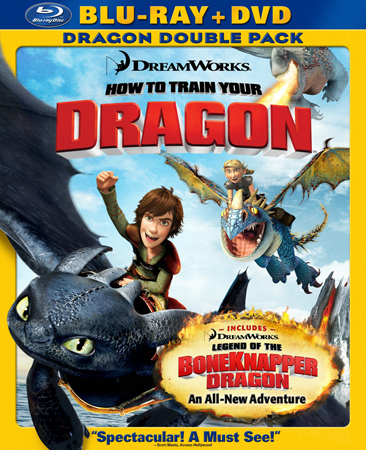 Cressida Cowell grew up in London and on a small island off the west coast of Scotland. She is the author of How to Train Your Dragon, a book turned into a 3D film released earlier this year under the same title. She holds a BA in English Literature from Oxford, a BA in Graphic Design from St. Martin’s, and an MA in Narrative Illustration from Brighton. Currently, she lives in London with her husband and three children.
Cressida Cowell grew up in London and on a small island off the west coast of Scotland. She is the author of How to Train Your Dragon, a book turned into a 3D film released earlier this year under the same title. She holds a BA in English Literature from Oxford, a BA in Graphic Design from St. Martin’s, and an MA in Narrative Illustration from Brighton. Currently, she lives in London with her husband and three children.
We chatted with her about the process of optioning a book and what that’s like as an author.
When approaching the film, do you feel it is an adaptation of your book? An extension? Or just something set in a similar universe?
That’s a very difficult question to answer. The film and the book are so different. And yet, they’re also the same at the same time. Some of the dragons are my dragons, directly based on my dragons, and some of them are the inventions of the animation team at DreamWorks. So it’s very, very difficult to say quite what the relationship is. I suppose I can only really answer it from my point of view, which is that I suppose I see them as different things. For instance, I’m eight books in to a 10 book series, and a decision that I admired very much in the movie was when Hiccup lost his leg at the end of the movie. I thought that was a really powerful thing to do. A wonderful thing to do for a disabled kid out there who could go see a major hero in a major Hollywood movie with a character like him, or like her, up there on the screen. I thought it was a fantastically powerful thing to do, and very appropriate for the character of my Hiccup. Actually, in the books, it’s a very appropriate Hiccup thing for that to happen. But it isn’t something that’s going to happen in the books. I’m not going to fit that into my books, because the books have a plot and trajectory of their own. So it isn’t something that I could fit in or even want to at this point, even though I admire that decision very, very much.
Well, speaking of characters, and Hiccup specifically, he has similar traits in both the film and the book, but the story’s different. So how does that change the themes and character development in the movie versus the book?
I think it changes the theme particularly. The themes are very much in the same territory, but I have to say, my feeling going into the whole thing, and still now, is that films and books are very different mediums. I can only speak for myself, I suppose, and the way that I approach it, which is I don’t think for a film, even when I go see a film (let alone have my own book developed into a film), I don’t go seeking for it to be exactly the same as the book. I look for it to be a wonderful movie. And that is the criteria by which I judge a film.
But that’s a very personal thing. Some people go to a film and they want it to be exactly how they imagined it to be in the book. But my view of it is that’s virtually impossible! When you read a book, and one of the wonderful things about books, is that they’re not a very bossy medium, are they? They leave a lot to the reader’s imagination. So every book, in a way, is different because it’s a combination of what the writer tells you and what you imagine. But it’s virtually impossible for a film to be exactly how you imagine a book to be, even if it’s trying. Or even if it thinks it’s trying to be as close to the book as it possibly can. And my view, and this is my very personal view, is that the important thing is to make it a wonderful film. And that’s how I personally judge it. And quite often, adaptations are wonderful books really are not wonderful movies. (laughs)
My real wish and hope going into the process was what they made was going to be a wonderful movie. That’s how I went into it.
So you were okay with them changing the story?
Well, I have to say they didn’t just come in and immediately change the story. They spent some time, actually — and my goodness it takes a long time to make a film — they took about five years to set the story. So it was something that emerged over the course of the film. But yes, I was okay.
I think the film is wonderful. I really, really enjoyed the film. When it was optioned, the things that they were interested in about the book were the things that I felt were very important. They were interested, for instance, in the relationship between Hiccup and Stoic and they weren’t just interested in that funny dragons thing, if you know what I mean. But the reason they were interested in it was because they weren’t going to make a farce movie, a movie that was just purely fun, they were going to make a movie that was genuinely moving. And I felt that the movie they made was genuinely moving and a wonderful movie. I might have felt very differently had I not liked the movie.

Could you expand on that a bit more? As an artist, how does it feel when other people are modifying or changing something that you dedicated so much time to and worked so hard on?
In the book world, I find it very difficult to be edited. I don’t like that first step at all. And indeed, in my book world, I am king and queen and president and everything. And as an author, and my goodness I’m the writer, the illustrator, the book world is completely my world. I act out the voices in my head. I do everything. But the making of a movie, by its very nature, is a very different thing. You have to be open to the idea of a movie. For instance, even a single voice reading of your book changes it. Not to mention having actors, character interpretations by hundreds and hundreds of actors. If you allow it to be made into a movie at all, I think you have to be open to the idea that it’s going to be a process that relies on other people’s creativity. And you’ve got to be open to that creativity.
And my books, I’m just thinking of them being read on tape — they’re read over here in England by a wonderful actor named David Tennant — and one of the characters, Kamikaze, he reads as Welsh. And I never thought of Kamikaze as Welsh (laughs) and he reads him in this wonderful way. But I would never say to David he can’t read Kamikaze as Welsh because that would’ve taken away from his experience reading.
I think I wouldn’t have optioned it if I felt I would find that too hard. But I felt very, very differently about my books and about them changing, because I feel that very strongly as my world.
Last question. If dragons were real, would you own one? What would its name be? And what would his special characteristic be?
Well, of course, one of the things about being a writer is that you write things that you really wish could happen. So of course, I would love to own a dragon and I would feel sort of disloyal if I didn’t say Toothless. My Toothless is very small, very disobedient, and has a stammer. But, I have a very soft spot in the books who is called StoneFly. And she’s a little larger than Toothless. She’s about the size of a Labrador and she is a mood dragon. A chameleon dragon who changes color related to her mood. And she’s very, very beautiful. And I think that’s the dragon that I would love to have.


